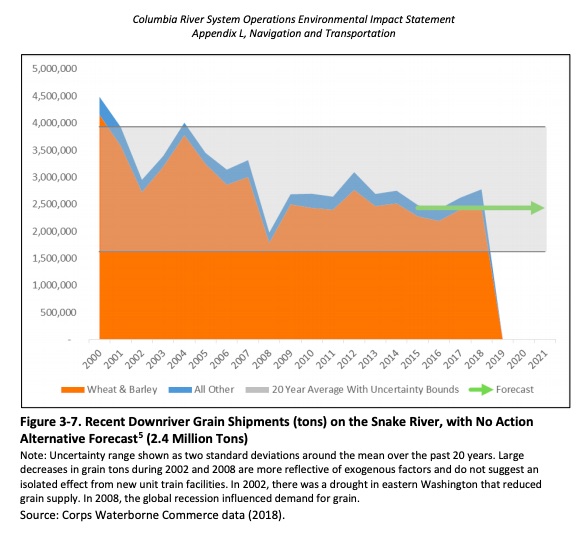forum
library
tutorial
contact

Snake River Ag Stakeholders Comment
on Klamath Dam Removal
by Matthew Weaver
Capital Press, November 18, 2022
|
the film forum library tutorial contact |

|
Snake River Ag Stakeholders Comment
by Matthew Weaver
|
"You lose one dam, I think you could start losing them all."
-- Chandler Goule, CEO of the National Association of Wheat Growers
 Regional stakeholders are mixed on whether federal regulators' decision to breach four dams on the Klamath River has any bearing on future arguments to breach dams on the lower Snake River.
Regional stakeholders are mixed on whether federal regulators' decision to breach four dams on the Klamath River has any bearing on future arguments to breach dams on the lower Snake River.
The Federal Energy Regulatory's Commission (FERC) decision is "disappointing," but the Klamath dams serve "distinctly different purposes," said Michelle Hennings, executive director of the Washington Association of Wheat Growers.
"The Snake River provides significant power generation for the region and is an important transportation route for agriculture and other goods," Hennings said. "Similar action on the Snake River would be even more problematic and disruptive to the economy of Washington State."
WAWG will continue to monitor impacts of the decision, Hennings said.
Northwest RiverPartners, which serves not-for-profit community-owned electric utilities in the region, said the decision to remove the Klamath River dams has no bearing on the Snake River dams.
"Our organization doesn't support dams for dams' sake," executive director Kurt Miller said. "Every dam is different."
RiverPartners has known for some time that the Klamath dams were likely to come out, he said.
"They were literally walls in the river," he said. "Those are dams we didn't see any reason to support preserving. It was clear the owner of the dams (thought) they were expensive and were not providing very much electricity. For them to be upgraded to provide fish passage would have cost them a lot of money."
PacifiCorp owns the Klamath River dams.
FERC only acts on requests from licensees, and does not initiate any such actions of its own, said Mary O'Driscoll, director of the media relations division for the regulatory commission. Any proposal for dam breaching would have to come from a licensee.
The Snake River dams are owned and operated by the U.S. Army Corps of Engineers. Congressional authorization would be needed for the Army Corps to pursue breaching the dams.
The Snake River dams are "almost the exact opposite" of the Klamath River dams, Miller said.
"The only thing they really have in common is that there is four of each of them," he said. "The lower Snake River dams are the perfect example of dams you want to keep."
The lower Snake River dams produce up to 3,000 megawatts of electricity, while the Klamath dams produce closer to 100 megawatts, Miller said.
The Klamath dams have no fish passage, while the Snake River dams have "the most advanced fish passage systems in the world" and pass juvenile fish "at the same rate as a free-flowing river," Miller said.
Miller understands that some in the Klamath River community are concerned about the dams being removed.
"The litmus test that we use is, is the dam providing value to society, because dams do change ecosystems, so for a dam to exist, it needs to provide value to society," he said.
The Klamath dam demolition proposal has a price tag of $500 million. Miller said it speaks to the value of the Snake River dams that the price of removing them would be "100 times higher." A recent federal and Washington state report estimated it would cost at least between $10.3 billion and $27.2 billion to replace all the benefits of the Snake River dams.
Miller believes "anyone who goes beyond the headlines" will recognize that the Klamath decision won't have implications for the Snake River dams.
"Obviously there are some anti-dam activist groups that will want to use them as an example," he said. "But we try to call those groups out politely. If you get past the initial talking points, they'll acknowledge they're not the same dams."
Others worry that breaching the Klamath dams opens the door to further breaching.
"This is setting the precedent -- I think this would make having a conversation around the Snake River more difficult if they did find a way to breach any other dams," said Chandler Goule, CEO of the National Association of Wheat Growers. "You lose one dam, I think you could start losing them all."
The Klamath Basin is important for irrigation in the dry region, Goule said. He also stressed the importance of the entire river transportation system, including the Columbia-Snake and the Mississippi River, for farmers.
The U.S. should use infrastructure funding to update the systems, Goule said.
"This breaching dams conversation needs to stop," he said.
learn more on topics covered in the film
see the video
read the script
learn the songs
discussion forum
